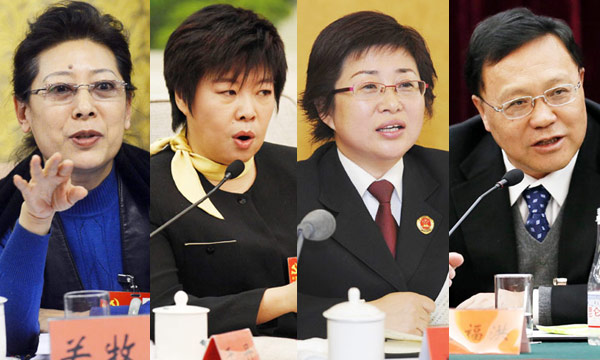Quarry workers get new jobs in clean-city push
By An Baijie (China Daily)
Updated: 2012-11-14 02:40
Chang Wenyu thought he would be unemployed when the quarry he worked for in a small city in East China was ordered to close this year out of environmental concerns.
The 49-year-old resident of Chaohe township in Rizhao, Shandong province, earned up to 3,600 yuan ($580) a month, almost double the average income in his hometown, since starting at the quarry.
 |
|
Public bicycles ready for use in Wuhu, Anhui province. Bike rental systems have been introduced on a large scale across China, adding an effi cient and green option to the transport mix in cities. [Photo/Xinhua] |
The local government closed it in March, along with a large number of polluting companies in the region, as it tried to get away from the city's environmentally devastating growth mode.
Chang said he expected to live in poverty again.
However, like many others who lost jobs in the government's crackdown on polluters, he was given a job at a green-tea processing plant, an industry that the government promoted following the closures.
Chang now earns about 2,400 yuan a month, 30 percent less than he did at the exhausting and dirty quarry job. It is a bittersweet turn of events, he said.
"The bad news is that my current salary is much less than before, but the good news is that I don't have to breathe dusty quarry air anymore."
Townships like Chaohe in Rizhao relied on stone quarries to expand their economy.
But the hundreds of quarries discharged polluting waste into the rivers, threatening the safety of the city's drinking water.
"Some stone quarries have destroyed the mountains' ecology, threatening wildlife and agriculture," the government said in a statement this year.
That forced the government to rethink its development model and in a campaign that ended in March, the city shuttered 74 heavily polluting quarries, protecting mountains that provided the stone.
To deal with dust pollution from the remaining 183 quarries, the city built an industrial park with modern pollution-processing facilities.
Forty-nine stone businesses have already moved to the industrial park, according to the city, and 91 others have applied to make the move.
After the quarries closed, the city's economic growth was not as high as before, said Yang Jun, Party secretary of Rizhao.
But the city remains determined to restructure polluting industries to pursue a cleaner environment, Yang, a delegate, said on the sidelines of the 18th National Congress of the Communist Party of China.
He said the direction of Rizhao's economic expansion was made clear by President Hu Jintao's statement in his report to the congress on Thursday that "the building of an ecological society should be given high priority".
"President Hu said in his report that we should build 'a beautiful China'," Yang said. "We should seek a healthy development model with less environmental destruction."
After closing the businesses, the city sought more sustainable development from green industries such as fruit and tea cultivation.
The government recently announced support policies to encourage environmentally friendly industries.
And the closure of polluting quarries proved effective in environmental protection: the amount of solid pollutants in the upper streams of the city's polluted Honghe River has decreased from the peak level of 4,540 mg/L to the current 30 mg/L, according to a report released in late October by the environment protection bureau.
Contact the writer at anbaijie@chinadaily.com.cn
Related Stories
Provincial greenways combine leisure with ecology 2012-11-10 08:09
Ecological progress highlighted in report 2012-11-09 08:03
Binzhou increases focus on ecology, innovation 2012-11-08 07:52
Distinct ecological economy brings benefits to Sanjiang 2012-10-24 14:04
CPC faces economic-ecological harmony challenges 2012-10-21 14:44

Top News
A new generation of leaders
Xi's address to the media
World welcomes China's leadership change
Video







